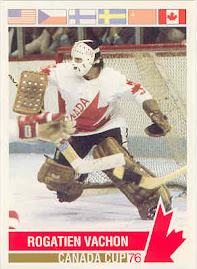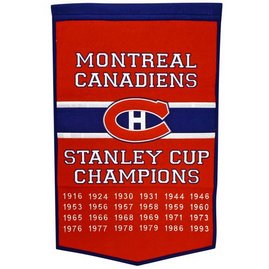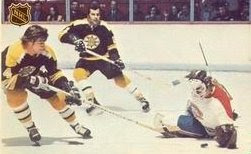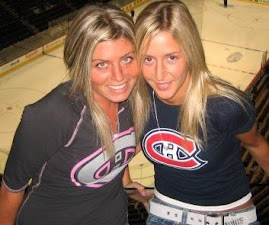
Montreal AAA were crowned the Stanley Cup champions for the second consecutive year. On March 22, 1894, in what is considered the first Stanley Cup playoff game ever, the Montreal AAA beat the Montreal Victorias 3-2. Five days later, the AAA club downed the Ottawa Generals 3-1. Montreal AAA forward Billy Barlow scored twice in each post-season contest as the AAA successfully defended their title. The four-way tie for first AHA standings necessitated Stanley Cup playoffs for the first time. The Quebec Hockey Club withdrew from competition after a dispute over scheduling, so the remaining three teams played a round robin.
Montreal won and lost a game to Ottawa during the regular schedule for a 5-3 record. The Ottawa Capitals, the Montreal Victorias, and the Quebec Hockey Club were also 5-3. The Montreal Crystals were an imperfect 0-8. Of the four teams tied, the Victorias had the best plus/minus, having scored 36 goals and allowing only 20. The Champion AAA scored 25 while letting in just 15 and their finals opponants, the Capital weren't far off with 24 scored and 16 allowed. Quebec tallied 26 times while being scored upon 27 times.
As the only non-Montreal area team, Ottawa were given a bye to the final. After the final victory, fans carried the players off triumphantly. A challange by a team from Osgoode Hall in Toronto, champions of the OHA, was accepted then cancelled due to lack of ice.
The players who formed the Montreal AAA for the 1893-94 season were:
Billy Barlow, who weighed but 125 lbs. was the hero of the game, scoring the winner at 9:02 of the second half.
George James, at cover point, enjoyed his one and only Cup victory.
Herbert Collins played every minute of every game for the AAA, leading the league with a 1.88 GAA.
Allan Cameron played point for the balance of the season.
Clare Mussen scored once in each of the two league games he played this season.According to game reports from the finals, "Mussen, barlow and Hodgson rushed that puck around in a way that made the Ottawa men nervous."
Archie Hodgson scored two goals in as many playoff games this season.
Edward O'Brien was a bank clerk when not playing hockey.
Haviland (Havie) Routhscored 5 goals in the season opener, a 7-0 win over Quebec.
Arthur "Toad" Waud and Alex Irving played but one game in the AHA this season.
Alex Kingan scored 4 goals in as many games this season.
James Stewart, a point man the previous season, was now the AAA's president.
Harry Shaw was the acting secretary of the club and later became the honourary secretary of the CAHL.

A newspaper article, amusing by today's standards, read as follows:
"The hockey championship was decided tonight, and never before in the history of the game was there so large a crowd or so much enthusiasm. There were fully five thousand persons present at the match; and the tin horns, strong lungs and a general rabble predominated. The match resulted in the favour of Montreal by three goals to one. The referee forgot to see many things. The ice was fairly good."
The Montreal Gazette, dated March 23,1894 (page 8) ran this article:
The hockey season is over and the championship has been won. The season has been a long one, and perhaps the most brilliant in the history of the game.
It is all very well to talk about the hockey of the olden days when people were not so strict about off-sides and when practically everything went; but the old times were never like these. They were plainly old, with a constantly increasing tinge of improvement showing all the way through. But now the game is brought clean up to date and it is about as warm as any admirer of the fin de siecle regime could wish for. There is one thing made most palpable, and that is that outside of lacrosse, hockey is our great game.
It would not be right to say that tin horns tintinabulated, but they made a much more certain sound, which the acoustic properties of the Victoria rink despatched back in heart-rending reverberations. It would also be unfair to say that the spectators were in any way prejudiced, but they had their favorites, the majority, of course, rooting for all they were worth in favor of Montreal. The Ottawa men are great hockeyites, but of course they did not receive the same support that the local players did. It was a case of blood being thicker than water.
As regards the whole season it will be well to remember a prediction made in the beginning of the season to the effect that Montreal could give all the others points on finishing. The prediction has been verified and now the M.H.C. again stand triumphant against the rest of the hockey world. At the beginning it seemed as if the last year's champions would not be in the game, but, like climbing a hill, the man who reaches the summit first wins, and that is the case with Montreal.
Not only the Canadian championship, but the Governor-General's cup depended on this match, and Montreal can fly its colors in the face of any hockey breeze that ever blew.
The Victoria rink last night held the largest crowd ever packed into the rink in its history. There was "siss-boom-ah," "rah-rah-rah" and several other audible tokens of imbecility and enthusiasm mixed. Some kind people had extravagantly blown themselves on tin horns, which they blew afterwards with an apparent idea of getting square on the question of expenditure. The horns might have cost all the way up to five cents originally, but they made enough trouble to give a lucrative practice to any reputable aurist. This, of course, was only an outside part of the game and did not interfere with the play.
It was a question of championship and Montreal had to win. There is one thing Montreal hates to do -- that is to lose -- and that settles it.
It may seem strange to anybody who knew the game to discover how the score came out as it did; but that fact is easily explained. Clever play and acquaintance with the rink accounted for it. In a match like this, where the championship of the whole country is in the balance, the players can afford to stand under more severe criticism than is usually meted out to amateur clubs, and in this connection it may be said that the referee was not nearly strict enough. The ice could not be expected to be good, and the conditions generally could be much improved upon if these great deciding games could be held earlier in the season. Nobody was ruled off, but James and Pulford ought to have been. Hockey is not necessarily synonymous with homicide.
Montreal won by three goals to one and the following were the men who put up the match: --
For Montreal, in goal was Collins, at point was Cameron, the cover point was James, the forwards were Routh, Mussen, A. Hodgson, Billy Barlow.
For Ottawa, in goal was Morrell, at point was Pulford, the cover point was Young, the forwards were Kirby, J. McDougall, S. McDougall, and Russel.
The referee was Mr. Scott of Quebec, and the umpires were Messrs. A. Anderson and W. Irwin.
In the first half Montreal had decidedly the best of the play. Their attack was almost perfect and their defense was invulnerable. McDougall and Russell seemed to be a whole team, but even their hard work was not equal to the resistance met with from Collins and James.
The Montrealers had the best of the rushing game, a point in which they seemed to excel, for their combination seemed almost perfect up to the point of scoring. Then there was an obstruction in the way, and his name was Morrell. Shot after shot was religiously piled in upon the devoted fortress held by Ottawa, but none of them were absolutely straight. That little round bit of rubber seemed to have a magnetic attraction for the Ottawa flags, but somehow or other it could never get through. For eight minutes Montreal forced the visitors to a strictly defence game and nothing but the best sort of luck could prevent them from winning. It was Montreal first, last and all the time. Then the Ottawa men became aggressive and made things warm for Montreal. How warm it was may be judged from the fact that two hockey sticks were broken -- one on each side; but this was merely accidental with a capital A. Then there was some trouble in the way of a scrimmage. There was a lot of chopping and it looked as if the Montrealers were going to win out on the start, but Pulford and Kirby got the rubber out of danger and the latter, following up his lead, passed to Cross, recived it again from McDougall and then scored. Time, 12 minutes.
The second game was a beauty from a hockey point of view and one of the men who is deserving of particular credit is Hodgson, who played a magnificent game and made things particularly uncomfortable for the visitors. In fact, it was only the incomparable goal keeping of Morrell that saved Ottawa from a more decisive defeat. How it was that Montreal only scored one goal in the first half is one of those things that "no fellow can find out," for their play certainly deserved better.
SECOND HALF
In the second half there was seen about as good hockey as could be wished for. The visitors made great efforts and their attack was splendid, but the forwards could not pass Allan Cameron or James. The Montreal defence seemed impregnable, while Barlow, Hodgson, and Mussen rushed that puck around in a way to make the Ottawa men nervous. In this half the visitors had a great many good chances, but they could not succeed in scoring.
A short stoppage was made in this half on account of McDougall sustaining an injury to his leg. Another feature was the warning which the referee gave to Messrs. Pulford and James. The next goal, however, was scored by Barlow after nine minutes' play and it took twelve minutes more before Hodgson, after a splendid exhibition of hockey, secured the third game for Montreal. No other goals were scored until time was called, and once again Montreal stands at the head of the hockey procession.
One of the pleasing features of the match was the display of ribbon. Every lady almost in the rink wore the favors of their particular club and never did belted knight in joust or tourney fight harder than the hockey men.
THE VICS IN LUCK
Even in defeat it is a source of happiness to know that efforts have been appreciated, and the Victorias have been particularly lucky in this respect, especially as this time the ladies have shown their appreciation and admiration of the boys who have fought such a fine up-hill fight all through the hockey season. Yesterday afternoon Mr. Watson Jack, president of the Victoria club, received a small package containing ten other little packages, each of which contained a gold breast pin, and on top of all was a letter that will make the players feel prouder than any number of gold pins. It is one of those delicate little attentions that will be appreciated when other more import documents will be forgotten. The only trouble is that every member would sooner be the possessor of the manuscript, for it is written in a beautiful lady's hand. The request was made that the pins be presented before last night's match, but owing to the late hour of receipt this was impossible.
The following copy of the letter will tell the story, and it only remains to be added that the Victoria are hunting around for a new unabridged dictionary to find words to express their feelings and their gratitude:
March 22nd
Dear Mr. Jack,
We have great pleasure in presenting the accompanying pins (ten) to the members of the Victoria Hockey club who played in the earlier and later matches of the season. We would like the team to know how we have rejoiced with them in their victories, sympathized with them in their defeats, and at all times admired the pluck and skill with which they have sustained the honor and fortunes of their club. We feel quite sure that if next season play wins instead of luck, your club will be the well deserved possessors of the championship. We would be pleased if the team could be presented with the pins before this evening




























































































































































No comments:
Post a Comment